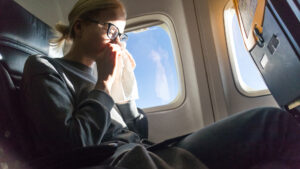Do you tend to get sick after returning home from a trip? It’s not all that surprising considering just how germy airports and airplanes can be. Combine that with the general strain that travel puts on a human body and, ta-da, you’re sick.
The next time you fly, spare yourself the agony of week-long sniffles by following the tips below.
It's Common to Get Sick After Flying. Here's How to Avoid It.
Hydrate! Hydrate! Hydrate!
If you’re wondering where to point the finger here, blame the low levels of humidity in the cabin. Without adequate moisture, our noses and throats dry up, making us more susceptible to the germs that cause colds and other illnesses.
Keep nostrils moistened by using nasal sprays like NasoGel. Drink plenty of water throughout your trip, but don’t wait until you're in the air to start hydrating. Swig on your hydro flask in the hours leading up to your flight so that your body has time to process.
And go easy on liquids that are known to dehydrate the body, like booze and coffee.
Related: To Avoid Getting Sick When Flying, Choose This Seat
Not All Aircraft Are Created Equally
Check your aircraft before booking, particularly for longer flights, and make sure you're flying aboard a newer plane with as much cabin humidity as possible.
Cabin humidity typically hovers around 20% on most aircraft, though sometimes it can be as low as 4%. To put that into perspective, the Environmental Protection Agency suggests that homes be kept at around 30% to 50% humidity.
While not that high, newer aircraft such as the 787 Dreamliner and the Airbus A350 do allow for a higher humidity level of around 25%. That, along with higher cabin pressure, will help reduce dehydration, headaches, and fatigue upon arrival.
Sanitize Hands and Surfaces Repeatedly
You’re probably already in the habit of washing your hands after a trip to the toilet, but don’t forget about all the other germy surfaces you touch when traveling. No one has the time to soap up after every check-in kiosk or tray table, but at least give yourself a little squirt of hand sanitizer before inadvertently touching your mouth, nose, or eyes. Pick up a few travel-sized bottles of hand sanitizer (if you can find it) that can be clipped onto your bag straps. It's also a good idea to pack some travel-sized bacterial wipes to rub down tray tops, armrests, and even seatbelts, which are known to be among the most germ-laden areas of any aircraft.
Related: The Travel Insurance You Need to Buy and the Kind You May Already Have
Take Your Vitamins
Ok, so there’s not a lot of solid evidence that taking a ton of vitamins before travel will do much to shore up your body’s defense system. But! Many travelers claim it works for them, and there’s no harm in taking a few vitamin C supplements throughout the duration of your trip. All-purpose multivitamins, such as this one from Dr. Tobias, will also do just fine.






